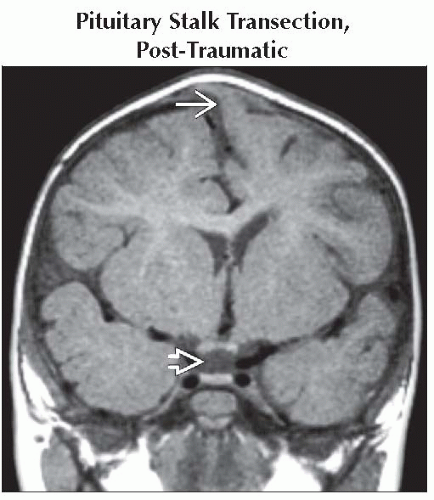Absent/Thin Infundibular Stalk
Anne G. Osborn, MD, FACR
DIFFERENTIAL DIAGNOSIS
Less Common
Pituitary Stalk Transection, Post-Traumatic
Pituitary Stalk Transection, Post-Surgical
Pituitary Stalk Anomalies
Septo-Optic Dysplasia (SOD)
Holoprosencephaly
Rare but Important
Neurocysticercosis
Meningitis
ESSENTIAL INFORMATION
Key Differential Diagnosis Issues
Is small/absent stalk congenital or acquired?
Clinical information extremely helpful
History of trauma or surgery?
Hypothalamic/pituitary axis dysfunction?
Short stature?
Helpful Clues for Less Common Diagnoses
Pituitary Stalk Transection, Post-Traumatic
Usually occurs following motor vehicle accident
Can occur with closed head injury
May occur with or without accompanying basilar skull fracture
Pituitary Stalk Transection, Post-Surgical
Children: Most common after craniopharyngioma resection
Adults: Most common after macroadenoma resection
Pituitary Stalk Anomalies
Most common = ectopic posterior pituitary
Posterior pituitary “bright spot” in hypothalamus
Stalk thin or absent
Shallow sella, small pituitary
Less common = duplicated stalk
Two separate, thinned stalks present
Infundibular recess of 3rd ventricle widened, interposed between duplicated stalks
Tuber cinereum thickened, often fused with mammary bodies
Septo-Optic Dysplasia (SOD)
Absent septum pellucidum
Frontal horns “pointed” inferiorly
“Squared” or “box-like” appearance of lateral ventricles on coronal imaging
Small optic chiasm
Holoprosencephaly
Many people consider lobar holoprosencephaly = SOD
Helpful Clues for Rare Diagnoses
Neurocysticercosis
Racemose NCC cysts in suprasellar cistern surround, stretch/thin infundibular stalk
Meningitis
Children with group B streptococcus
Diencephalic infarction
Secondary atrophy of optic chiasm, pituitary stalk
Image Gallery
 Coronal T1WI MR in a child with remote head trauma who subsequently developed pituitary insufficiency shows traumatic cephalocele
 and absent/inapparent pituitary stalk and absent/inapparent pituitary stalk  . .Stay updated, free articles. Join our Telegram channel
Full access? Get Clinical Tree
 Get Clinical Tree app for offline access
Get Clinical Tree app for offline access

|